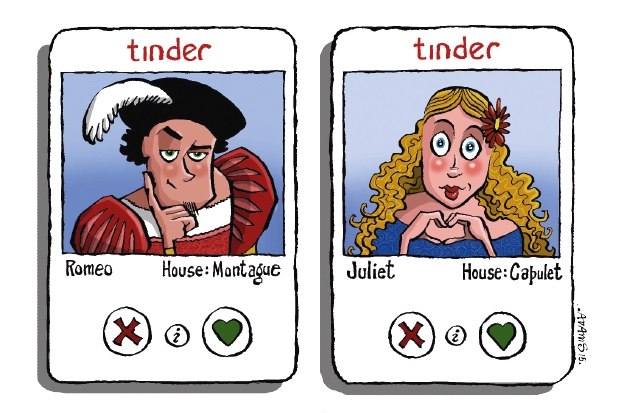There was once a time when finding a twenty-something on a dating site was as rare as finding a pensioner in a branch of a Hollywood Bowl. Having an online dating profile was a last-ditch attempt at love reserved only for those intent on finding a long-term partner. Match.com, E Harmony, Guardian Soulmates; the clue was in the name. An earnest, humourless amalgamation of abstract nouns promising everlasting love. They were websites that boasted of their high marriage rates and whose users all listed ‘the great outdoors’ as a hobby. Dating sites were not entered into lightly.
Then, in 2013, an app called Tinder was launched and a back door was opened into this brave new world for all sorts of people to pour into; the young professional who’s too busy to meet someone, the divorcee looking for fun, the twenty-something looking for love. Blink and you might have missed it, but the stigma of online dating evaporated over night and for a short while, it seemed like every single person under 35 had a Tinder profile. The clue was in the name – it was fiery, sexy. Fun.
The app is free and simple – you are presented with a photo of a person and you swipe left if you’re not interested; right if you are. It is also linked to your facebook profile, so you are able to see if you have friends in common (this is never more than a reassuring way to double-check your prospective love interest isn’t mad, married or has a basement of human taxidermy etc). If two people swipe each other right, they match and are able to chat to each other. If that goes well, it is de rigueur to add each other on whatsapp. Whether you remain pen-pals or follow up with a real-life meeting is up to you.
Tinder came just at the right time for a generation of people suffering from a busy epidemic. When we’re not busy in the office making money to pay extortionate rent, we’re busy drinking cocktails out of jam jars in pop-up bars every night because we’re all suffering from FOMO and YOLO and other such deadly afflictions. We’re busy reading the Morrissey biography, busy blogging about the Morrissey biography. Busy tweeting about how busy we are. We’ve got apps to streamline our overloaded schedules and do everything for us – order a cab, order food, order books. It was only a matter of time before a timesaving app was developed for dating too. The appeal is in the handiness – this is takeaway dating. Portable courtship.
Beyond their functionality, dating apps are a natural step for generation Y as we have done all our formative training in love on the internet. As teenagers, instead of sneaking a look at The Joy of Sex in our local library, we went creeping about the darkest corners of the Internet for filthy photos. Instead of sending letters and locks of hair, we sent long emails and YouTube links songs. We can still remember the AOL dial-up tones on our mum’s computer, like a love song, while we anxiously waited to log on and see if anyone had sent a new message. Tinder is just the grown-up version of that.
But along with fans and its many magazine features came Tinder’s critics. People were (rightly) dubious of a matchmaking system based solely on physical appearance and questioned the grandiose claim that it was a dating app rather than just a way of organising casual sex with strangers. Over time, Tinder’s image has gone from cheeky to seedy, with more and more people screen grabbing and sharing various predatory chat-up lines and naked profile photos online.
Other facts suggest these apps are also having knock-on effect on real-life interaction. This month, it was reported that bars are closing down in the Netherlands as a result of dating apps as people no longer need to go out to meet prospective partners when they can do it from their sofa. There is, of course, a mad logic to this – why iron an outfit, go to a bar, pluck up the courage to chat someone up and risk rejection when you can short-circuit this process and head straight to the sex?
There’s a catch 22 in the culture of online dating – it’s come about because people can’t meet people, but the more people meet via a third party website, the more difficult it is for people to meet of their own accord. For something that is meant to help us connect, the internet often does a pretty good impression of driving humans further apart. Dating sites are killing the real-life chat-up.
But just as we declare ourselves out – a new app is on the scene. Happn. With a clever name and a feature that allows you to track how far away your love interest is and whether you’ve ‘crossed paths’, it’s Tinder upgraded. If Tinder’s the Jag xK8, Happn appears to be the Aston DB9.
Yet audiences have been dubious; weary and just off the well-trodden pastures of Tinder, they predict the same seedy fate for Happn.
And perhaps they are right. Because herein lies the lesson I think we’re finally learning: if you think you need an app because you’re too busy to find love, maybe, what your heart’s really telling you, is you’re not quite ready for it yet.
Dolly Alderton is a dating columnist for The Sunday Times Style magazine






Comments